Landfills are growing, waste is hardly recycled. How Kazakhstani eco-entrepreneurs are fighting indifference

Environmentally hazardous landfills are still the norm in Kazakhstan, one of the richest countries in Central Asia. In Almaty, the country’s largest city, activists and eco-entrepreneurs are doing their best to create an alternative to unsustainable waste management.
At the forefront of the battle for a more sustainable planet is the black soldier fly.
In Kazakhstan, as in many other countries, this battle looks very intense.
The country’s government recently committed to achieving carbon neutrality by 2060, but Kazakhstan still has a long way to go to achieve a green economy.
About half of the country’s energy consumption comes from coal, the economy is dominated by the oil and gas industry, and the vast majority of household waste is not recycled.
For Almaty entrepreneur Bekezhan Kairgaliyev, all this means his eco-friendly business has great potential – if enough people know about it.
“We receive about 400 kilograms of organic waste per day. About 130-150 kilograms of fertilizer are produced from this,” Kairgaliev told Azattyk during an environmental campaign when the city began accepting organic waste for the first time.
“We are currently working with 27 restaurants. We want to start working with schools as well,” he added.
The dark flies, about two centimeters long, are able to process organic waste. Farms for breeding “black soldier flies,” similar to Kairgaliev’s, have appeared in countries around the world over the past decade.

Insect larvae can consume large volumes of organic waste within just a week of hatching, producing nutrient-rich compost several times faster than traditional compost piles.
In doing so, they help reduce emissions of methane from landfills, the second most common greenhouse gas after carbon dioxide but one that has a more powerful impact on global temperature rise.
A LITTLE HELP FOR A BIG COMMITMENT OF THE COUNTRY
At the UN Climate Change Conference in Dubai in 2023 (COP 28), Kazakhstan became the first Central Asian country to join the Global Methane Commitment. This commitment is shared by more than 150 countries, the document obliges participants to reduce methane emissions by 30 percent by 2030.
Kazakhstan’s commitments focus on the oil and gas sector, the largest source of methane emissions in the energy-rich country and the second largest in the world after agriculture.
In third place on the list of global “suppliers” of methane into the atmosphere is organic waste rotting in landfills.
The UN Environment-backed Black Soldier Fly initiative is one of two “underfunded but highly effective solutions to reduce the impact of landfill emissions,” according to the Climate and Clean Air Coalition, along with bio-mats that are used directly on landfills .
Entrepreneurs who breed black soldier flies can also use the larvae of these flies to create valuable and environmentally friendly feed for other industries, such as fish farms.

Kairgaliev is not asking for any financial assistance from the government.
He says his business is profitable and costs his customers less than traditional waste collection.
But he argues that the government could at least raise awareness of the business and ensure that different types of household waste are sorted before collection.
In the past, authorities have made half-hearted efforts in this direction, he says: “[There was a time] when there were [separate] yellow containers. But it didn’t work at all. Only one garbage truck would come. And it would just take everything to the dump.”
REDUCING WASTE ON EARTH
The Kazakh government has acknowledged that it is not doing enough to manage waste in an environmentally sound manner.
Less than a quarter of the 4 million tonnes of household waste generated last year was recycled, according to authorities.
Other assessments are even more depressing.
At a conference in April hosted by the Atameken Chamber of Entrepreneurs, industry experts said that about 3.5 percent of the 100,000 tons of plastic discarded nationwide in 2023 was recycled.

In March, Environment Minister Yerlan Nysanbayev promised that 37 solid waste processing plants would be built in the near future.
But sustainability initiatives must come from both the bottom up and the top down.
One organization that is trying to raise awareness is Recycle.Birge, which regularly holds “eco-cleanups” in Almaty. The focus is on collecting and sorting waste into specific categories: different types of plastic, metals, cosmetic and medical waste, batteries, and more should be placed in different containers.
In some cases, the beneficiaries of such events are local “eco-entrepreneurs” who turn waste into goods. For example, Yuri Kirdyushkin, whose project Plastic Harahura has used about three tons of plastic waste over the past two years to create new things and works of art.
But more important, according to the organisers, is the introduction of a recycling culture and the dissemination of information about what things can be recycled and reused.
Leila Mukhitdinova, known to her friends as “Farmer Leila,” does something similar, albeit on a slightly smaller scale. She runs a WhatsApp group called Eco-Guardians, which has about 100 members. The group discusses waste disposal and recycling issues, such as whether tea bags can be placed in compost piles and what eco-friendly options exist for disposing of expired medications.

Mukhitdinova, who says she hasn’t bought new clothes in 20 years, benefits from the group.
Many of the group’s members offer to donate leftover food to the chickens and goats she keeps in her yard outside of Almaty.
But she is proud that many of her group’s members are now keen on composting – a hobby that is still rare in Kazakhstan – and helping efforts to reduce the burden on landfills.
“These chats [on WhatsApp] are important because we can look a little strange from the outside. Sometimes even our relatives think that we are strange, almost crazy. And that is why we need to support each other. People need to understand that they are not the only ones,” says Mukhitdinova.
https://rus.azattyq.org/a/svalki-rastut-othody-pochti-ne-pererabatyvayut-kak–ekopredprinimateli-boryutsya-s-bezrazlichiem/33188609.html

